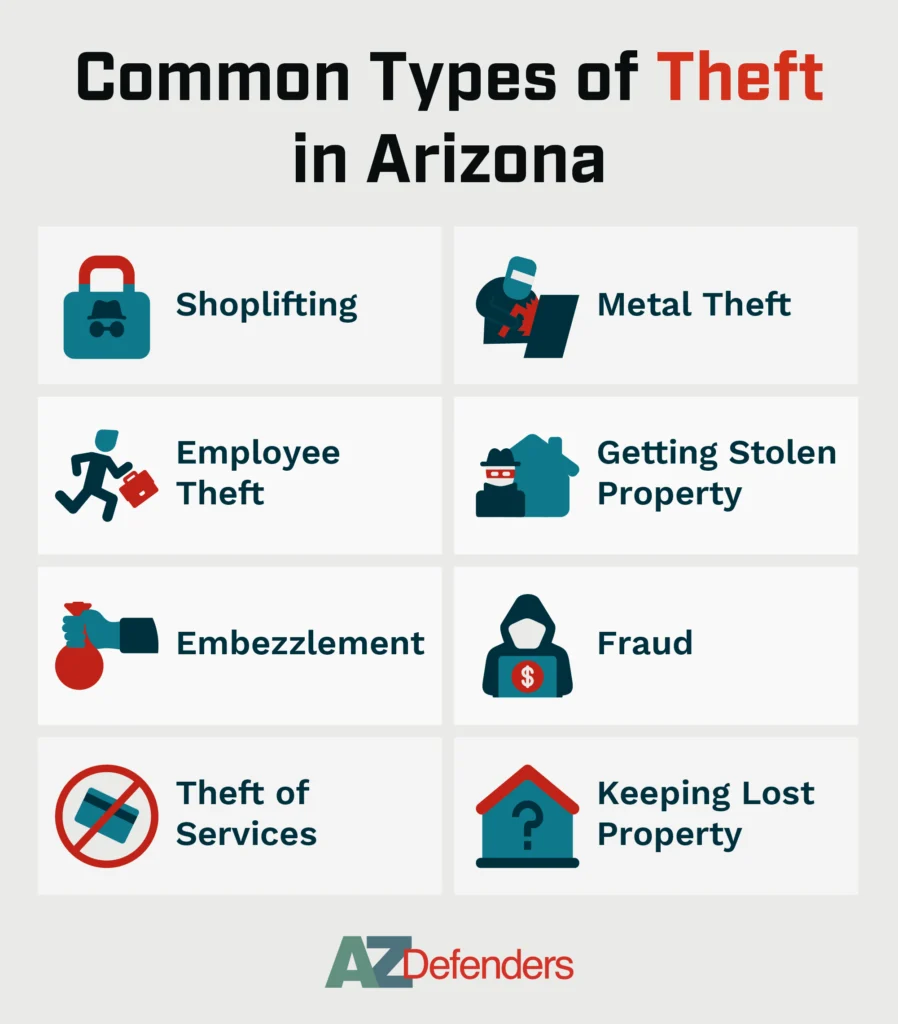
Posted on November 26, 2025 in Assault & Violent Crimes
Under Arizona law, the crime of theft can take different forms. Depending on the specific kind of theft, the crime can be a misdemeanor or a felony.
In this post, we at AZ Defenders analyze Arizona’s theft crime statute, Arizona Revised Statutes (ARS) Section 13-1802. We identify the various types of theft, the penalties associated with each, and some possible defenses to a charge of theft.
If you are facing criminal charges for theft in Arizona, call AZ Defenders at (480) 456-6400 or contact us online to speak with one of our experienced criminal defense attorneys.
Under ARS 13-1802, a person commits theft in any of ten ways:
Theft cannot be committed inadvertently. All of these variations require a knowing state of mind.
ARS 13-1802 provides technical descriptions for commonly known kinds of theft. Here are some common types of theft that are criminal acts in Arizona.

Shoplifting is one of the most common kinds of theft in Arizona and is defined in ARS 13-1805. Shoplifting occurs when a person enters a retail store and leaves with or conceals goods without paying for them.
“Organized retail theft” happens when a person shoplifts items with the intent of selling them and/or when a person uses an instrument, artifice, device, container, or other article to shoplift. Organized retail theft is a Class 4 felony. See ARS 13-1819.
This type of theft occurs when a person takes an item by using that individual’s knowledge of the business’s internal theft control policies.
It can also involve taking items out of the business without authorization when an employee enables an accomplice to leave the business without paying for items or to return items for money or credit that were stolen from the business.
While retail theft from an employer focuses on a crime that involves stealing products or services offered by an employer, non-retail theft involves stealing other items, like business supplies.
Embezzlement involves withholding and/or theft of assets for the purpose of converting them to your own use.
For example, embezzlement occurs when an employee of a company, who has money-handling duties, accepts payments to the company but keeps the money for themselves.
Embezzlement can also involve forgery and fraudulent transfers.
ARS 13-1802 includes many other kinds of theft crimes, including:
The statute also makes it illegal to commit theft of metals, both ferrous and non-ferrous metals. Ferrous metals are defined under ARS 44-1641, these are metals that will attract a magnet, and/or a scrap vehicle. Ferrous metals include iron, nickel, and cobalt, as well as compounds and alloys that contain a high amount of iron, like steel and rod iron. Examples of a non-ferrous metal are copper, aluminum, brass, tin, and bronze just to name a few.
A theft crime is punishable as a misdemeanor or a felony, depending on the specific nature of the theft, including the dollar value of the stolen property or services.
A theft conviction in Arizona is a Class 1 misdemeanor if the value of the stolen property is less than $1,000, and the item(s) were not a firearm. This is the lowest-level theft offense, and is often referred to as petty theft.
A Class 1 misdemeanor is punishable by up to $2,500 in fines, restitution to the victim, and up to six months in jail.
Depending on the monetary value of the stolen property, felony theft can range from a Class 6 felony up to a Class 2 felony.
A Class 6 felony conviction is the lowest-level felony crime in Arizona. Theft is a Class 6 felony if the value of the stolen property is between $1,000 but less than $2,000.
A Class 5 felony conviction is based on the value of stolen property being between $2,000 and less than $3,000.
If the value of the stolen property is between $3,000 and $4,000, this is a Class 4 felony offense.
The theft of a vehicle engine or transmission may also result in a class 4 felony conviction without regard to its value.
Organized Retail Theft is a Class 4 Felony regardless of the value of the property stolen.
Also, a person who commits shoplifting and who has previously committed or been convicted within the past five years of two or more offenses involving burglary, shoplifting, robbery, organized retail theft or theft, is a Class 4 Felony.
If the value of the stolen property is between $4,000 and less than $25,000, this is a Class 3 felony.
Class 2 felony theft is the most serious type of theft crime in Arizona. It involves theft of property of $25,000 or more in value.
All felony-level crimes in Arizona can also result in a fine of up to $150,000.
Several possible defenses exist to a charge of theft in Arizona. We introduce some of the more common defenses below.
If you own or have reason to believe that you own the allegedly stolen item in question, your lawyer may be able to argue that you did not steal the item.
As we stated above, a theft crime requires a knowing state of mind. Thus, if you can show that you did not intend to commit theft, this can be an effective defense against the charge depending on the factual circumstances of each individual case.
Sometimes you may be mistakenly identified as a suspect when another person committed the theft in question.
The consent of the property owner to your use of the allegedly stolen item is another way to create reasonable doubt about whether such use constitutes theft.
Consent is a defense that often applies to situations in which you know the property owner. This may be a family member, a friend, or a roommate who allows you to use an item of property.
Sometimes it may be possible to have the evidence against you thrown out of court, such as when the police obtained it improperly through an illegal search or seizure, or failed to maintain a proper chain of custody of the evidence, or violated your constitutional rights.
This defense may be available in a situation where the alleged victim of the theft is a vulnerable adult who made a gift of an item of property before becoming a vulnerable adult.
In some situations, you may be able to claim that even though you did steal an item, you only did so because you were forced to by threats or intimidation (duress) or that it was necessary under the specific circumstances unique to your case.
If you are charged with a crime under Arizona’s theft statutes, regardless of its classification, you need the services of an experienced, aggressive, and effective local theft attorney on your side.
The consequences of even a misdemeanor theft conviction can be serious, including a criminal record. Theft convictions can have devastating consequences because it is a crime involving dishonesty, often referred to as a crime of moral turpitude, which can make it very difficult to obtain employment and housing. You need an experienced lawyer to help you get the best possible result in your case.
At AZ Defenders, our criminal defense attorneys have over 200 years of combined experience. Our Phoenix theft lawyers have a proven track record of winning cases and are recognized as some of the most aggressive criminal defense attorneys in the state.
Contact AZ Defenders by calling (480) 456-6400 or contact us online to schedule a free consultation. Get the legal representation you need. Our law offices will take your call 24/7.